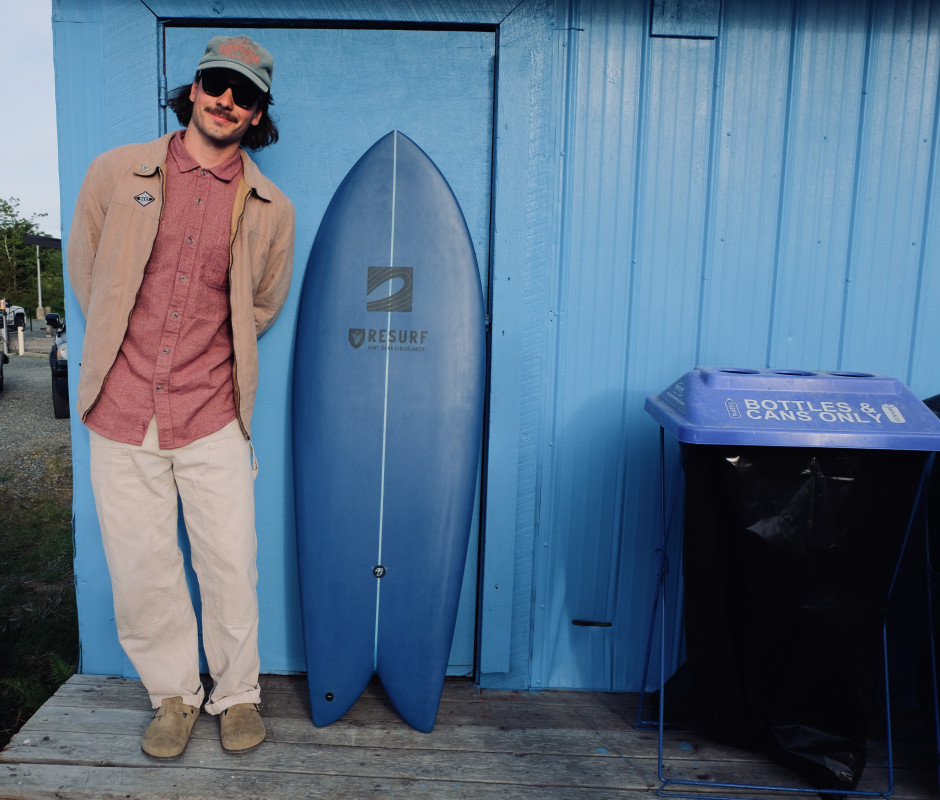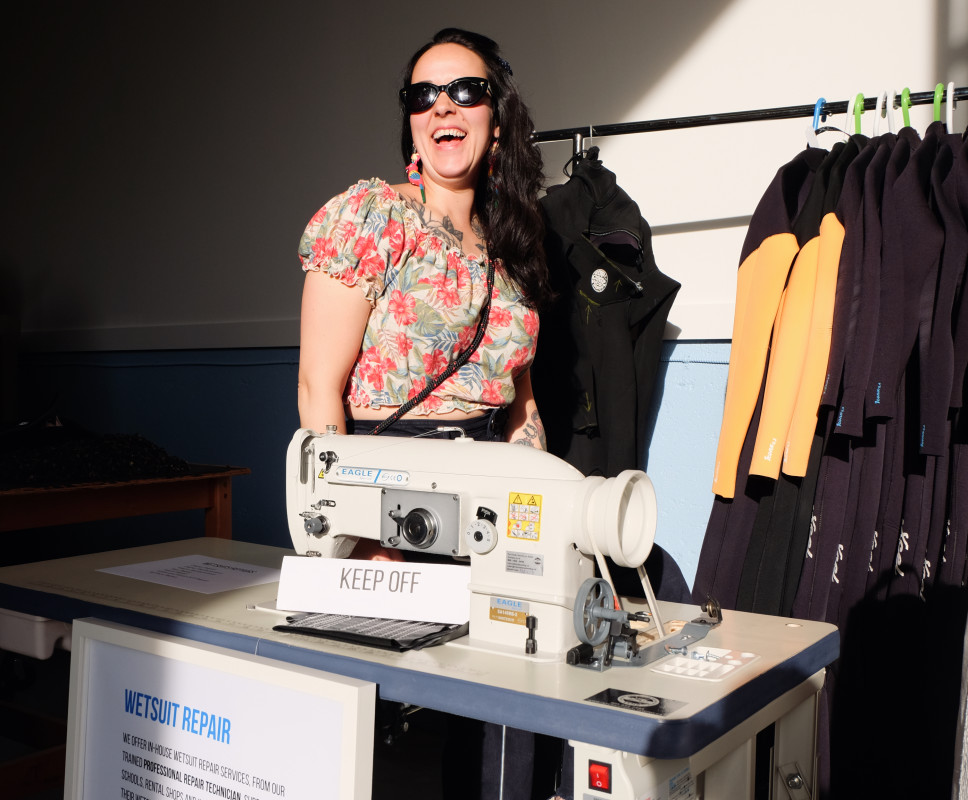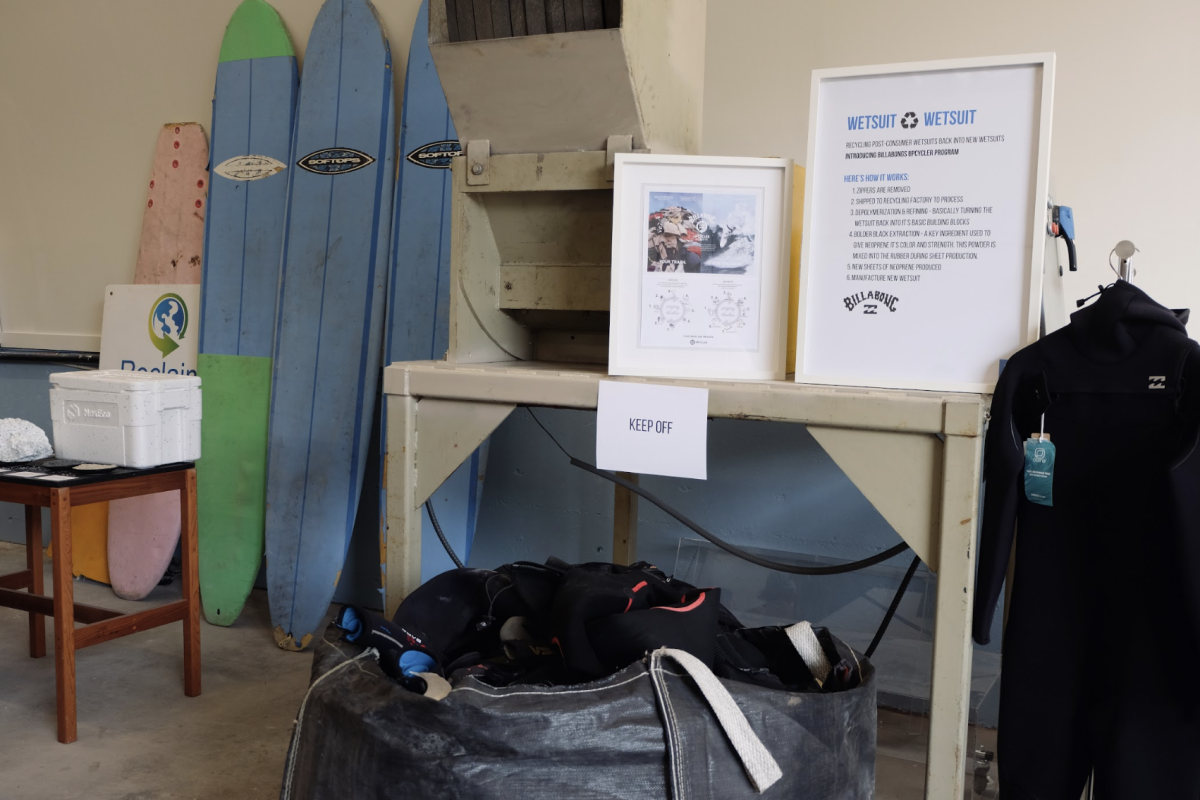The beauty of dreams come true was cheered over tacos and beer at the grand opening of the “Blue Barrel” in Ucluelet, British Columbia on the west coast of Vancouver Island in the traditional territory of the Ucluelet First Nation. Launched by Surfrider Foundation Canada, the new facility offers the country’s first surf gear repair and recycling program, which they’ve aptly called “ReSurf”.
“It’s happening. It’s all happening and we’re really grateful. We are one of the first organizations to ever do anything like this, so I hope we succeed,” says Daniel Raab, ReSurf’s Surfboard Coordinator.
With over a dozen surf shops and surf schools on the Pacific Rim between Tofino and Ucluelet, throngs of dead wetsuits and damaged soft top surfboards are being stockpiled in backyard sheds and then chucked in the local landfill. Surfrider’s innovative ReSurf program takes a new approach to the classic old surf gear story by deploying the four Rs: repair, reuse, remanufacturing and recycling.

Raab is working with local shapers, Expandable Polystyrene (EPS) manufacturers and major surf brands to figure out the most eco-friendly path to reincarnating those toasted soft tops into something new.
“So far, we’re able to work with partners to turn about 95 per cent of the material into processed, raw materials to make new products,” says Raab, pointing to a pile of mulched EPS foam.
“This can be recycled into a (blank surfboard) which you can shape,” he shared.
The non-profit estimates that up to 13,000 pounds of wetsuits and 11,000 pounds of surfboards are disposed of annually at the local landfill, and until now, there has been no solution to capture or recover these materials in Canada.

Lou Hamel is living her best life as ReSurf’s full-time Wetsuit Technician. Hamel has a background in fashion design and sailmaking and earned her neoprene wrangling skills after starting a small business that focuses on upcycling retired watersports gear into dog apparel.
“I broke a lot of needles before I got good,” says Hamel at the Blue Barrel launch event. “I kind of did all my prototyping and practice before. I didn’t know I was preparing for this; for something much bigger. The thing that is really cool, as soon I started upcycling neoprene, I realized that I was not enough. It was much bigger than what my two hands could do. It’s amazing to be part of Surfrider and make a bigger impact.”
She’ll be working with an industrial walking foot sewing machine and heavy duty industrial thread to stitch holes and restitch seams on dozens wetsuits from surf schools and local surfers.
Fees for the wetsuit repair service is based on labour, plus materials, and flows on a case-by-case basis.
Hamel says it’s hard to know how many wetsuits will come in for repairs because Canada has never had a shop of this kind before.
“Surf school wetsuits take quite the beating. We’ll be able to stretch their life as much as we can and then when it’s at the end of their life, we’re able to shred it and recycle it,” she says.
Related: Surfrider Foundation celebrates successful One Ocean event honoring ‘Women Making Waves’
ReSurf purchased an in-house neoprene shredding machine, so various companies can turn the shreds into new products like yoga matts.
They also send the zippers to Reclaim Plastics in Vancouver.
“We’re dealing with every little part of the wetsuit,” says Hamel.
Surfrider Foundation Canada’s Regional Manager Lilly Woodbury sees the Blue Barrel as a decade long dream come to fruition.

“I hope that ReSurf can play an influential role in the movement towards adopting sustainable materials, production and end-of-life management of surf gear. Surfers, and the surf industry as a whole, have a massive responsibility to protect and restore the oceans and coastlines that make the sport of surfing possible,” Woodbury says.
ReSurf operations manager Adam Gilmer is stoked to start working with all the players in the Pacific Rim’s growing surf industry.
“By partnering with residents, visitors and the surf industry, we can build a more sustainable future for our coastline and the sport we love,” he says.
The Blue Barrel facility and the ReSurf program was made possible through a Government of British Columbia’s Plastic Action Fund, and down the line, the team aims to expand as a warranty repair centre for surf companies — double shakas!
Learn more at surfrider.ca/resurf.
Related: Surfrider Foundation Takes On Elon Musk, Space X In New Lawsuit

